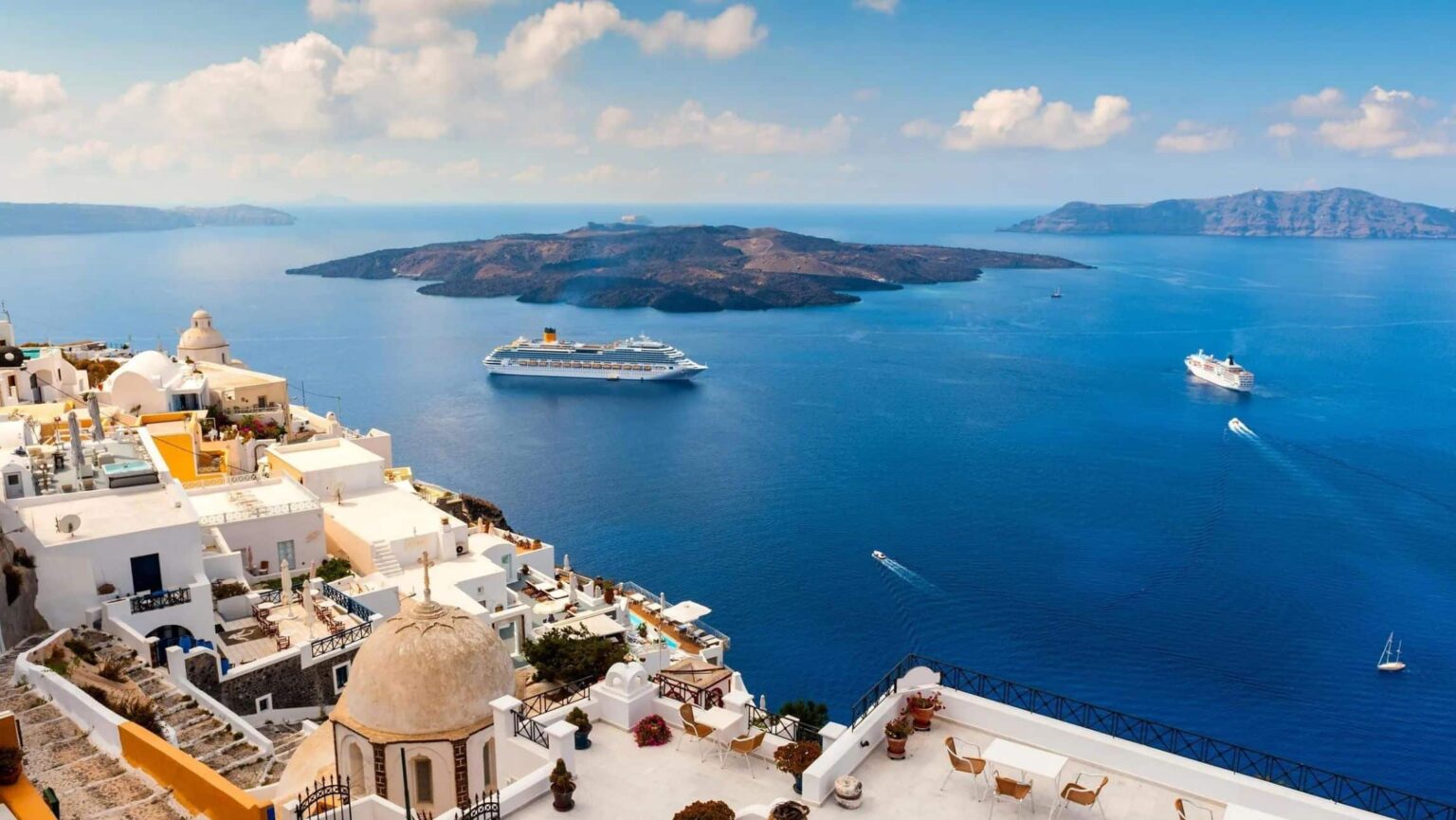The Greek Government is considering a new “disembarkation levy” on cruise passengers who visit popular islands like Santorini and Mykonos to combat over-tourism.
The proposed fee will look at charging passengers €10 after the Prime Minister, Kyriakos Mitsotakis made comments earlier this year about capping cruise numbers to the country’s most popular islands.
“We support both traditional tourism and cruise ship arrivals. We are looking to increase the disembarkation fee to €10 at Santorini and other popular destinations,” he told a SKAI TV, a Greek broadcaster.
The tax is part of a broader strategy to manage the increasing number of visitors visiting the islands, where residents believe that cruise has negatively impacted the islands.
Anyone who has stood in the queues at Santorini waiting to go up the hill to the town, 7 kms by cobbled and crowded road, knowns only too well the wait can last 2.5 hours in blistering temperatures. Many have ben known to faint from sunstroke while waiting.
I was once on an Azamara cruise where the captain looked at the number of ships expected, and put off our visit for a day when fewer visitors was expected.
So anything that alleviates the wait and ensures a visit to the tiny town’s streets goes well should be welcomed.
Ultimately, the revenue generated will be used to improve port facilities, fund environmental projects, and support local businesses affected by seasonal tourism fluctuations.
Earlier this year, the Greek government also introduced a new tourist tax for visitors staying in hotels, villas, apartments, and short-term rentals across the country. The rates will vary depending on the type of accommodation. For those staying in five-star hotels, there will be an additional charge of €10 per night, while those staying in three and one and two-star hotels will be charged €3 and €1.50 per night, respectively.
What the New Tax Means for Tourism
Authorities from local mayors up to the highest ranks of the Greek Parliament, including the Prime Minister, insist that these measures are necessary to protect their environments and cultural sites and, most importantly, promote sustainable tourism for those who are coming on holiday to Greece.
“People are spending a lot of money on Santorini, and they don’t want the Island to be swamped”, stated Mitsotakis.
The tax is seen as a way to manage the delicate balance of promoting tourism while preserving the islands’ beauty for future generations.
As the tax becomes a reality, implementing the cruise passenger tax could set a precedent for other countries grappling with similar challenges. The move highlights the growing recognition among destinations worldwide of the need to adopt sustainable tourism practices and address the long-term impacts of mass tourism.
How is the Industry Reacting to the New Tax?
The cruise industry has expressed concern over these developments, noting that wherever additional taxes and restrictions are in place, the traveller and local communities bear the brunt.
The industry though, recognises the importance of sustainability and is willing to embrace the new levy as a step forward in preserving the islands.
Cruise Lines International Association (CLIA), through its regional Director, Maria Deliganni, stated, “Cruise companies are committed to cooperating with popular cruise destinations on issues of sustainable development and responsible tourism.”
Ultimately, the industry’s unwavering focus is on working collaboratively with authorities to ensure the islands’ long-term prosperity, while continuing to provide unforgettable experiences for travellers.
Greece Following Others Lead
This move reflects a growing trend among several European destinations, including the Netherlands, which announced earlier this year that the number of river ship arrivals in its capital, Amsterdam, will be reduced by half by 2026.
This trend is not limited to Europe; it is also evident in parts of the United States, such as Alaska, where the cruise industry has been heavily criticised for its impact on local environments and communities.
Just last month, the Alaskan government introduced numerous new rules and regulations concerning cruise caps in the popular cruise destination of Juneau, requiring cruise lines to coordinate their schedules so that there are no more than 16,000 cruise passengers per day from Sunday through Friday.
The state has implemented passenger taxes to address environmental concerns and support local communities. These fees help preserve the environment that attracts tourists to the region as well as fund conservation efforts and infrastructure projects.







